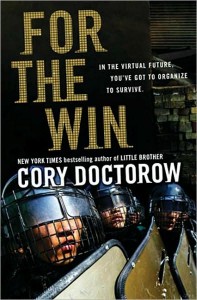 In the near future, an underground global economy has become fully realized, based on the understanding, manipulation, and acquisition of the virtual currencies of various online multiplayer games. With “gold farming” sweatshops scattered across the world, and entire fortunes made and lost with the click of a mouse, it’s a way for desperate gamers to make a living doing what they love. But a crisis point has arrived, as the farmers globalize, mobilize, and unionize, clashing with those who would exploit them. Caught up in this struggle are teens from America, India, China and more, fighting for the future online and in the streets. Once again, Doctorow is on the cutting edge with this exciting blend of economic theory, technological advances, game theory, and social activism. This isn’t just another YA adventure, it’s a manifesto for a new generation of Internet-savvy thinkers and doers.
In the near future, an underground global economy has become fully realized, based on the understanding, manipulation, and acquisition of the virtual currencies of various online multiplayer games. With “gold farming” sweatshops scattered across the world, and entire fortunes made and lost with the click of a mouse, it’s a way for desperate gamers to make a living doing what they love. But a crisis point has arrived, as the farmers globalize, mobilize, and unionize, clashing with those who would exploit them. Caught up in this struggle are teens from America, India, China and more, fighting for the future online and in the streets. Once again, Doctorow is on the cutting edge with this exciting blend of economic theory, technological advances, game theory, and social activism. This isn’t just another YA adventure, it’s a manifesto for a new generation of Internet-savvy thinkers and doers.
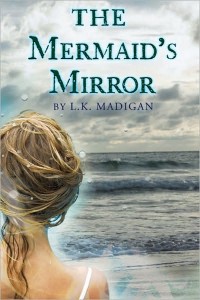 Lena has always felt an inexplicable tie to the ocean, and it’s grown stronger of late, as if calling her. On the verge of turning sixteen, she’s determined to finally learn how to surf, despite her father’s unyielding objections. But even as she takes to the water, she discovers the truth about her mother, who supposedly died in the ocean years ago: she was a mermaid. Given a chance to embrace her long-hidden heritage, Lena leaps at it, but will her new family and the mysteries of the deep seduce her away from the life she’s always known? Lyrical, romantic, and captivating, this aquatic coming-of-age tale makes for a fun, satisfying read.
Lena has always felt an inexplicable tie to the ocean, and it’s grown stronger of late, as if calling her. On the verge of turning sixteen, she’s determined to finally learn how to surf, despite her father’s unyielding objections. But even as she takes to the water, she discovers the truth about her mother, who supposedly died in the ocean years ago: she was a mermaid. Given a chance to embrace her long-hidden heritage, Lena leaps at it, but will her new family and the mysteries of the deep seduce her away from the life she’s always known? Lyrical, romantic, and captivating, this aquatic coming-of-age tale makes for a fun, satisfying read.
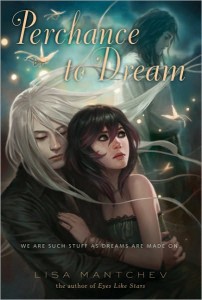 Having come into her power as the Mistress of Revels, Bertie Smith has left the Theatre Illuminata in search of Nate, her pirate friend who was kidnapped by the sea goddess Sedna. With her as always are the alluring air spirit Ariel, and a gaggle of mischievous Shakespearian fairies. With nothing going as planned, Bertie’s going to have to do a lot of improvising if she wants to rescue Nate, find her true father, discover her true origins, puzzle out the extent of her feelings for both Nate and Ariel, and make sure the show goes on. The sequel to Eyes Like Stars, this is another rousing adventure of literary and theatrical whimsy, filled with sly twists and humorous moments. Bertie’s continuing story deserves multiple encores and a standing ovation.
Having come into her power as the Mistress of Revels, Bertie Smith has left the Theatre Illuminata in search of Nate, her pirate friend who was kidnapped by the sea goddess Sedna. With her as always are the alluring air spirit Ariel, and a gaggle of mischievous Shakespearian fairies. With nothing going as planned, Bertie’s going to have to do a lot of improvising if she wants to rescue Nate, find her true father, discover her true origins, puzzle out the extent of her feelings for both Nate and Ariel, and make sure the show goes on. The sequel to Eyes Like Stars, this is another rousing adventure of literary and theatrical whimsy, filled with sly twists and humorous moments. Bertie’s continuing story deserves multiple encores and a standing ovation.
 In life, Karen DeSonne passed as straight, afraid to reveal her true orientation. In death, she’s passing as one of the living, a zombie girl hiding in plain sight. Even as bigots fan the flames of hate and intolerance against the “differently biotic” and make it nigh-impossible for zombies to go out in public, Karen’s going undercover to try and save her friends. But when she starts dating noted anti-zombie zealot Pete Martinsburg as part of the process, will she betray everything she holds dear? Passing Strange, like the others in the Generation Dead series, is a brilliant, poignant, compelling examination of the relationship of the outsider to society, with zombies standing in for any group you care to imagine and Karen as a protagonist worth cheering for.
In life, Karen DeSonne passed as straight, afraid to reveal her true orientation. In death, she’s passing as one of the living, a zombie girl hiding in plain sight. Even as bigots fan the flames of hate and intolerance against the “differently biotic” and make it nigh-impossible for zombies to go out in public, Karen’s going undercover to try and save her friends. But when she starts dating noted anti-zombie zealot Pete Martinsburg as part of the process, will she betray everything she holds dear? Passing Strange, like the others in the Generation Dead series, is a brilliant, poignant, compelling examination of the relationship of the outsider to society, with zombies standing in for any group you care to imagine and Karen as a protagonist worth cheering for.
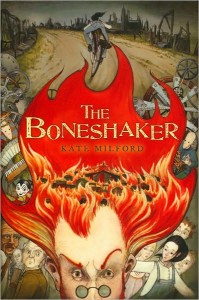 It’s 1913, and in the small crossroads town of Arcane, Missouri, anything can happen. When a traveling medicine show stops for repairs, bringing with it all manner of bizarre technological contraptions and dubious cures, Natalie Minks is alternately fascinated and worried. Even at a glance, she knows something’s not right with Dr. Limberleg and his companions. What she discovers will strike at the very heart and soul of her beloved home, leading an epic struggle for survival. A historical steampunk fantasy drawing inspiration from trickster tales, deals with the devil, and other folklore, this book’s crammed full of nifty ideas and awesome moments. Unique and wonderful, featuring a feisty, resourceful heroine, this book’s definitely a don’t-miss under any circumstances.
It’s 1913, and in the small crossroads town of Arcane, Missouri, anything can happen. When a traveling medicine show stops for repairs, bringing with it all manner of bizarre technological contraptions and dubious cures, Natalie Minks is alternately fascinated and worried. Even at a glance, she knows something’s not right with Dr. Limberleg and his companions. What she discovers will strike at the very heart and soul of her beloved home, leading an epic struggle for survival. A historical steampunk fantasy drawing inspiration from trickster tales, deals with the devil, and other folklore, this book’s crammed full of nifty ideas and awesome moments. Unique and wonderful, featuring a feisty, resourceful heroine, this book’s definitely a don’t-miss under any circumstances.
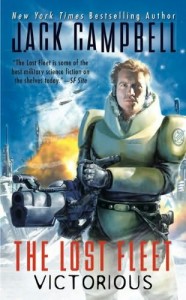 After long months and great hardship, Captain John “Black Jack” Geary has accomplished the impossible: he’s brought the Alliance fleet home. The fleet’s suffered great losses in its desperate, prolonged escape from the heart of Syndic space, but under Geary’s anachronistic leadership (he was lost in cryogenic suspension for a century prior to the start of the series), they’ve rediscovered what it means to be warriors and victors. But just because they’ve come home doesn’t mean the war is over. No, with fresh supplies and new ships, Geary has to take the fleet out one last time, to strike decisively at the Syndics and force an end to the never-ending conflict. And then he’ll have to deal with the non-human forces which have subtly manipulated Syndic and Alliance alike for decades. Obviously, the reward for doing a good job is having to do more of it; the reward for pulling off the impossible is a reputation as a miracle worker.
After long months and great hardship, Captain John “Black Jack” Geary has accomplished the impossible: he’s brought the Alliance fleet home. The fleet’s suffered great losses in its desperate, prolonged escape from the heart of Syndic space, but under Geary’s anachronistic leadership (he was lost in cryogenic suspension for a century prior to the start of the series), they’ve rediscovered what it means to be warriors and victors. But just because they’ve come home doesn’t mean the war is over. No, with fresh supplies and new ships, Geary has to take the fleet out one last time, to strike decisively at the Syndics and force an end to the never-ending conflict. And then he’ll have to deal with the non-human forces which have subtly manipulated Syndic and Alliance alike for decades. Obviously, the reward for doing a good job is having to do more of it; the reward for pulling off the impossible is a reputation as a miracle worker.
Serving as the capstone to the six book series, Victorious provides an emotional and visceral payoff for both characters and readers, as we get as concrete a conclusion to the various plot threads as we can hope for. The war is finally resolved, the aliens are addressed, Geary’s oft-repeated promises to step down as commander of the fleet, once the job is done, are handled, and the long-running romantic subplot involving Geary and his ever-faithful second-in-command, Captain Tanya Desjani, is given plenty of space to develop. Mixing razor-sharp military action with engaging character interaction, Victorious is as entertaining as the books which preceded it. It’s true that this isn’t the deepest, most philosophical series on the shelves; many of the secondary characters are little more than ciphers and walk-on parts, with only a mere handful standing out in a cast of thousands, and the momentum sometimes gets dragged down in strategy and battle tactics. These flaws are balanced out by the sheer fun factor of this book, and this series as a whole. It’s fast-paced popcorn reading, and would translate well into other mediums, such as television or comic books. In the end, I can safely say that I greatly enjoyed this last installment of the current series, and I look forward to the recently-announced spin-offs which promise to pick up where this leaves off. “Black Jack” Geary’s work isn’t done yet, it seems.
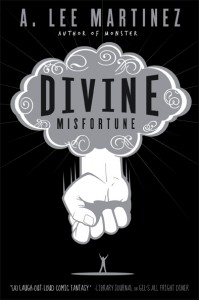 Welcome to a world where the gods are alive and well and dealing with humanity on their own terms. Everyone’s got a personal god, who takes care of them according to the level of faith involved and sacrifices offered. Want that promotion? Sacrifice a calf to Baal. Looking for lower insurance premiums? Marduk’s your deity. Demeter might be handy if you want a lush lawn, and so forth. After years of holding out, Phil and Teri are fed up with seeing everyone else get ahead through worship while they get left behind… so they’re in the market for a god.
Welcome to a world where the gods are alive and well and dealing with humanity on their own terms. Everyone’s got a personal god, who takes care of them according to the level of faith involved and sacrifices offered. Want that promotion? Sacrifice a calf to Baal. Looking for lower insurance premiums? Marduk’s your deity. Demeter might be handy if you want a lush lawn, and so forth. After years of holding out, Phil and Teri are fed up with seeing everyone else get ahead through worship while they get left behind… so they’re in the market for a god.
Enter Luka, raccoon god of prosperity. Let him crash on your couch and eat your leftovers and maybe have a few friends over, and he’ll take care of you. Oh, but he might forget to mention the goddess ex-girlfriend still stalking him, or his archenemy, the dreaded god Gorgoz, whose minions are lurking in the shadows. And don’t mind when he and your best friend the god groupie start hooking up, because, well, raccoon god of prosperity. Phil and Teri may have their own god now, but he comes with a lot of baggage, and their lives are about to get hazardous. When mortals get wrapped up in the affairs of the gods, it rarely ends well.
Never one to repeat himself, A. Lee Martinez once again offers up a screwball fantasy where the mundane and the magical clash with tongue-in-cheek results. The concept is sheer genius: gods surviving in the modern world by actively soliciting worshippers for a little quid pro quo arrangement. And well, look, Divine Misfortune had me at “raccoon god of prosperity.” Yes, I am that easy to please. This book could kick puppies, and I’d still have given it a fair shot just for that bit. Sometimes, the high concept is all you need, especially when the author is firing on all cylinders.
But in all seriousness, this is a great story. Reminiscent of Tom Holt in his prime, it’s steeped in mythology, both traditional and newly-invented, and heavily accented with a dry humor that somehow makes it all the more enjoyable. It’s not the deepest of storylines, nor the most profound, but it’s thoroughly entertaining and good for a few laughs. I’ve never been disappointed by Martinez’s books, and Divine Misfortune is as good as anything else he’s ever done.
Plus, raccoon god of prosperity. I’m thinking I may need to set up an altar for that one. Just in case. But hopefully I won’t end up with a giant feathered snake god sleeping on my couch as a result.
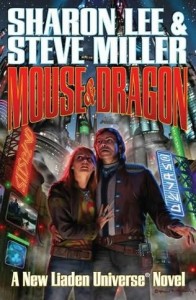 Once upon a time, there was a scared, abused woman with a gift for mathematics, who won a spaceship in a card game, and saw it as her way free from a family who misused and underappreciated her. She eventually met a dashing young pilot, secretly one of the most powerful man on the planet, and they fell in love. Her wicked brother tried to stop her and steal her ship; she survived despite his efforts, and was reunited with her new love, to live happily ever after. Such was recounted in the classic Liaden novel, Scout’s Progress.
Once upon a time, there was a scared, abused woman with a gift for mathematics, who won a spaceship in a card game, and saw it as her way free from a family who misused and underappreciated her. She eventually met a dashing young pilot, secretly one of the most powerful man on the planet, and they fell in love. Her wicked brother tried to stop her and steal her ship; she survived despite his efforts, and was reunited with her new love, to live happily ever after. Such was recounted in the classic Liaden novel, Scout’s Progress.
Until now, we never knew what happened the next day. Aelliana Caylon has finally started to come out of her shell and live for herself, content in the knowledge that Daav Yos’Phelium, Delm of Clan Korval, cares for her, looking forward to flying her ship and establishing a measure of independence. But things are never as easy as they seem. Her clan refuses to let her go, determined to get their full value from even the most wayward of unwanted members. Propriety and balance must be maintained in the status-conscious, honor-obsessed society of Liad. Customs must be observed and procedures followed, and both Aelliana and Daav have a ways to go before they’re ready to give themselves to each other as fully as they like. And for those who have seen the future of the Liaden series, they know that this is a love story where happily ever after doesn’t necessarily mean forever.
It’s a testament to Sharon Lee and Steve Miller’s superb characterization skills, subtle plotting, and rhythmic use of language that this book can appeal to the heart as opposed to the more visceral senses. It’s easy to get caught up in the ebb and flow of the dialogue, the allure of the setting, and the steady movement of the players, and never miss the lack of more dynamic plot. Aelliana and Daav’s courtship and the stumbling blocks thereof make up the majority of the book, to such a degree that a more action-oriented sequence close to the end actually feels like an intrusion. Like the book this follows, Mouse & Dragon is essentially the bastard child of Regency romance and space opera, and in less capable hands, it wouldn’t be anywhere near as captivating.
I’ve always enjoyed the Liaden series, and of those, Scout’s Progress is my hands-down favorite. Thus, to have this continuation of Aelliana and Daav’s romance was an unexpected treat, one which hasn’t disappointed in the least. A lot of authors have tried to blend romance and science fiction, but very few do it anywhere near as well as Lee and Miller. Mouse & Dragon soars on all levels.
In the newest issue of Realms of Fantasy, cover-dated October 2010, I look at the following books:
The Boneshaker, by Kate Milford
Passing Strange, by Daniel Waters
Perchance to Dream, by Lisa Mantchev
The Mermaid’s Mirror, by L.K. Madigan
For The Win, by Cory Doctorow
Due to space considerations, a further three reviews may be found here on the Realms website:
The Demon’s Covenant, by Sarah Rees Brannan
Shade, by Jeri Smith-Ready
Shadow Grail #1: Legacies, by Mercedes Lackey and Rosemary Edghill
The following reviews have gone up recently over at SF Site:
The Lost Fleet #6: Victorious, by Jack Campbell
Divine Misfortune by A. Lee Martinez
Lastly, the following reviews from the previous issue of Realms of Fantasy, cover-dated August 2010, are now archived and available on my website:
Guardian of the Dead by Karen Healey
A Wizard of Mars/a> by Diane Duane
Hex Hall by Rachel Hawkins
The Dead-Tossed Waves by Carrie Ryan
The Shadow Hunt by Katherine Langrish
Other by Karen Kincy
Fever Crumb by Philip Reeve
Princess For Hire by Lindsey Levitt
This World We Live In by Susan Beth Pfeffer
As a special bonus, two more reviews, originally slated for that same issue but held back due to circumstances beyond my control, are available on my website for the very first time anywhere:
Thief Eyes by Janni Lee Simner
White Cat by Holly Black
As always, I welcome questions, comments, concerns, feedback, and review suggestions.
 In the months since the Moon was dislodged from its orbit, civilization has continued to fall into chaos and ruin. Now, as the point-of-view characters from the first two books in the series meet and fall in love, we see that things can always get worse. What could have been an uplifting conclusion to a trilogy is instead a rather bleak, depressing installment in the ongoing saga, where no character is safe and hope is a near-vanished luxury. Though compelling and richly-detailed, this book’s a real mood-killer. Hopefully the sun will come out if the series continues.
In the months since the Moon was dislodged from its orbit, civilization has continued to fall into chaos and ruin. Now, as the point-of-view characters from the first two books in the series meet and fall in love, we see that things can always get worse. What could have been an uplifting conclusion to a trilogy is instead a rather bleak, depressing installment in the ongoing saga, where no character is safe and hope is a near-vanished luxury. Though compelling and richly-detailed, this book’s a real mood-killer. Hopefully the sun will come out if the series continues.
